

Innovations made by the Project Based Learning (PBL) group of students of the Agricultural Industrial Technology Study Program of Politeknik Negeri Jember (Polije) have had a significant positive impact on society, especially for children with autism. Students who are members of this PBL group succeeded in developing a food product called Moster Cookies, which are soft cookies made from sweet potatoes that are rich in benefits and free from preservatives.
According to Isbatul Lailla, this innovation began with the utilization of rejected or unused sweet potatoes from PT Mitra Tani 27 Jember. Instead of being thrown away, these yams were processed into highly nutritious food products. This project not only provides a solution for industries facing food waste, but also has great benefits for certain groups of people, especially children with autism, who often require special attention regarding the content of the food they consume.
“We process rejected yam into yam paste which is then used to make soft cookies. This product is superior because it contains no preservatives and is gluten-free, making it very suitable for children with autism who are often sensitive to gluten content in food,” said Isbatul.
With a yam base that is high in fiber and low in gluten, Moster Cookies is a healthy snack alternative that can support the nutritional needs of children with autism without worrying about the negative effects of chemicals or gluten. Another advantage of Moster Cookies is its beneficial nutritional content, such as vitamins and minerals found in sweet potatoes.
“This cookie product is a snack that is not only delicious but also healthy, providing optimal intake for the bodies of children with autism who need a special diet,” she added.
Aulia Brilliantina, S.TP., M.P., Coordinator of the Food Industry Technology Study Program, emphasized that in this PBL program, students are asked to respond to problems in the industry, such as those at PT Mitra Tani 27, which has many edamame and reject sweet potato products.
“In addition to innovating, students are also trained to test the nutritional content of each ingredient used in their products. This is important to ensure that the products are not only innovative, but also meet the nutritional standards needed, especially for children,” explained Aulia.
By testing the nutritional content, students not only learn about the process of making products, but also gain a deeper understanding of the importance of quality and nutritional balance in every ingredient used. This process ensures that the products they make, such as Monster Cookies, truly meet nutritional needs that are in accordance with health standards and are safe for consumption by the target group.
This PBL program not only provides an innovative solution to edamame and yam reject waste, but also provides great social benefits. With Moster Cookies, children can have a healthy snack that not only fulfills their nutritional needs, but also helps them in their long-term health development. This innovation also opens up opportunities for more similar products to be developed in the future, which can provide wider benefits to society.
“Through Moster Cookies, we hope to help children get snacks that suit their dietary needs, without compromising on taste and nutrition. In addition, we also want to provide an example of how unused food ingredients can be processed into high-value products that benefit the community,” said Isbatul.
Through PBL programs like this, Polije plays a role in supporting the development of a food industry that is more environmentally friendly and more concerned with the needs of the community. (rda)